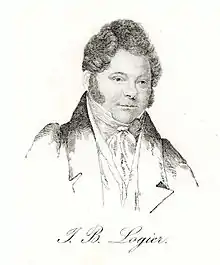Johann Bernhard Logier
Johann Bernhard Logier (9 February 1777 – 27 July 1846) was a German composer, teacher, inventor, and publisher resident in Ireland for most of his life.

Biography
Logier was born in Kassel and was first taught music by his father, a violinist. He moved to the England in 1791 and joined the Duke of Abercorn's regimental band as a flutist, later becoming director. After moving to Ireland with the regiment in 1802, he was appointed organist in Westport and in 1808 became director of the band of the Kilkenny Militia. In 1809 he became the musical director of the Royal Hibernian Theatre, before opening a successful music shop at 17 Lower Sackville Street (today: O'Connell Street).[1] Except for a three-year stay in Berlin (1822–26), he spent the remainder of his life in Dublin, where he died in 1846.
Logier invented the Chiroplast, a sliding frame meant as a pedagogical device to guide the hands and fingers while playing the piano, the intention being to improve and control the position of the hand and wrist. By staging public demonstrations of the mechanism and producing publications and studies to support his theories, the method became very popular within a short period of time. By having the system patented, he could earn licence fees from every teacher who used the method. "Chiroplast instruction centres" opened in Dublin, London, Paris, Berlin, Leipzig, and Dresden. The system had ardent followers and critics, with Kalkbrenner and Spohr among the more prominent followers. Green's music shop in London had sold 1,600 chiroplasts by 1824.[2]
He also developed his own teaching method, now called the Logier Method, which he published in his System der Musikwissenschaft (1827). In this method, several pupils are taught at a time, with technical instruction done together with instruction in principles of harmony. This lay the basis of group teaching in music.
Music
Logier's achievements as a composer have always been overshadowed by his successful inventions and educational methods, to the extent that many brief biographies don't mention his compositional activity at all. His work-list includes music for piano, flute, harp, bugle, and military bands. He also arranged popular and traditional songs for solo piano. One of Logier's largest compositions is the opera Brian Boroihme [sic!] (1810) on an Irish historical episode, which achieved some success and is an important work in the history of nationalism in Irish opera.[3] He also wrote an ambitious concerto for piano and orchestra op. 13 (1816). For a performance of his Battle of Trafalgar (1810) he gathered seven military bands, and The Battle of Vittoria (1813) was performed by 150 instrumentalists.[4]
References
- Adèle Commins: "Logier, Johann Bernhard", in: The Encyclopaedia of Music in Ireland, ed. H. White & B. Boydell (Dublin: UCD Press, 2013), p. 597–9.
- Commins (2013), p. 597.
- Axel Klein: "Stage-Irish, or The National in Irish Opera 1780-1925", in: Opera Quarterly 21 (2005) 1, p. 27–67.
- Commins (2013), p. 598.
- "Logier". Meyers Konversations-Lexikon (in German). 10 (4th ed.). 1890. p. 871.